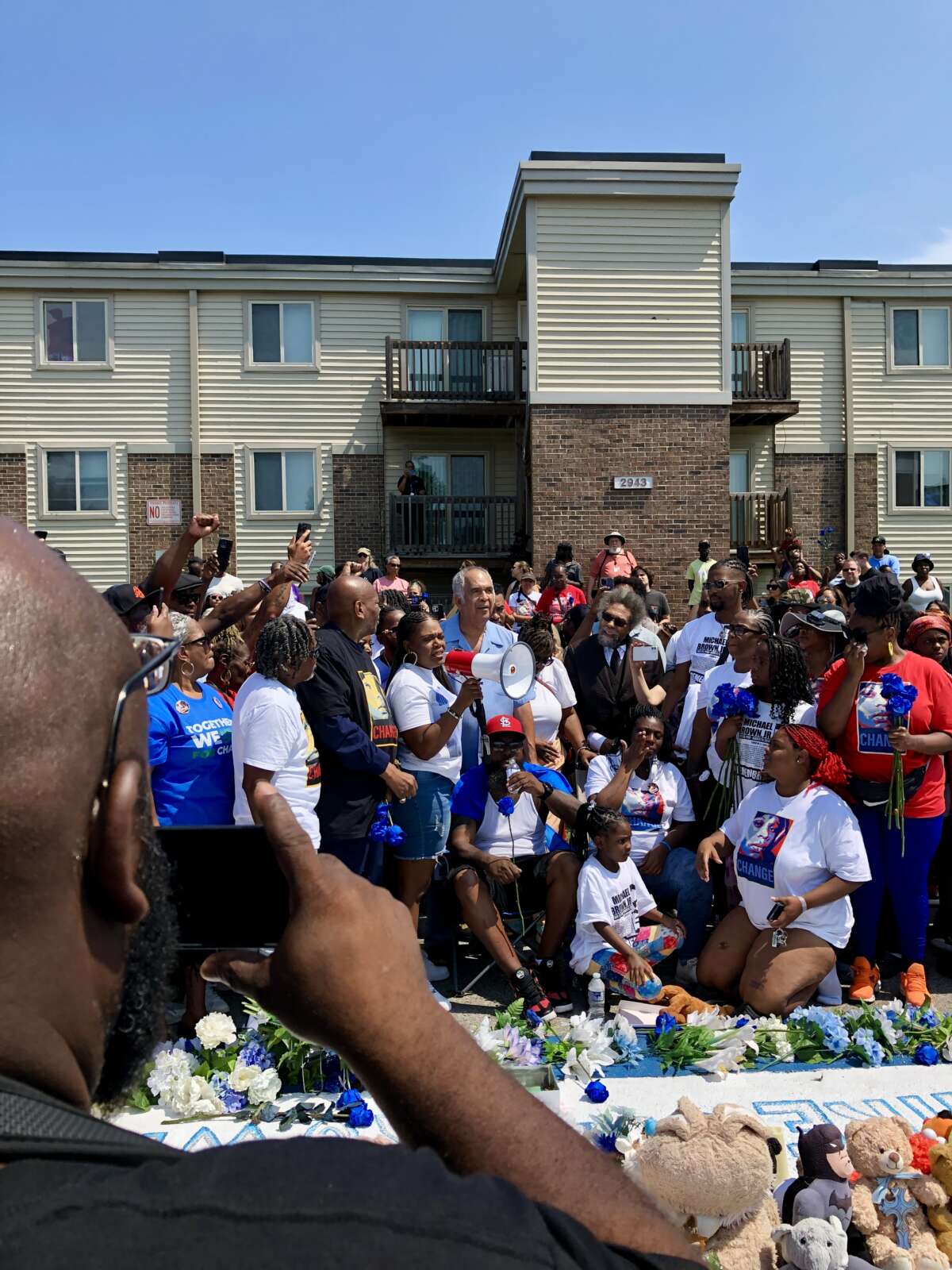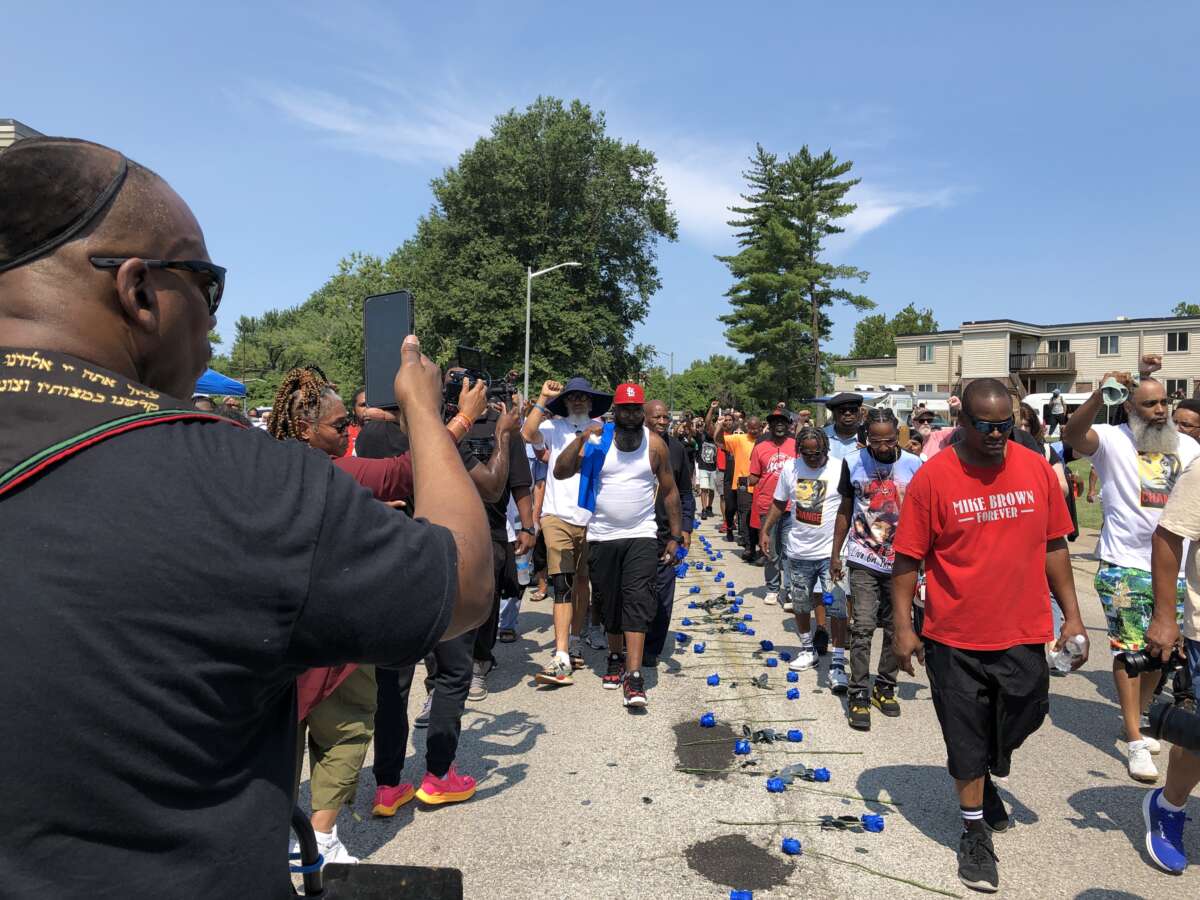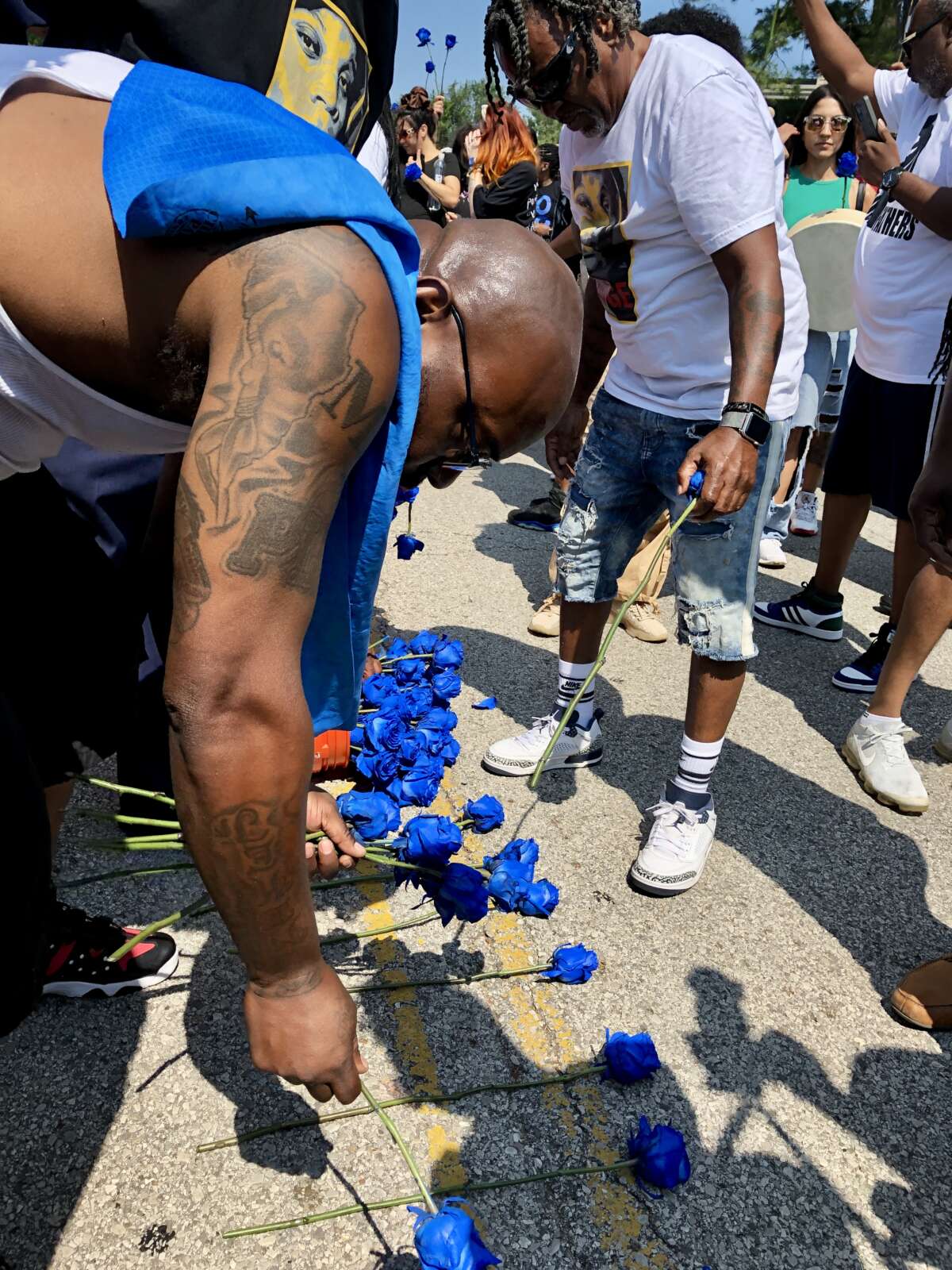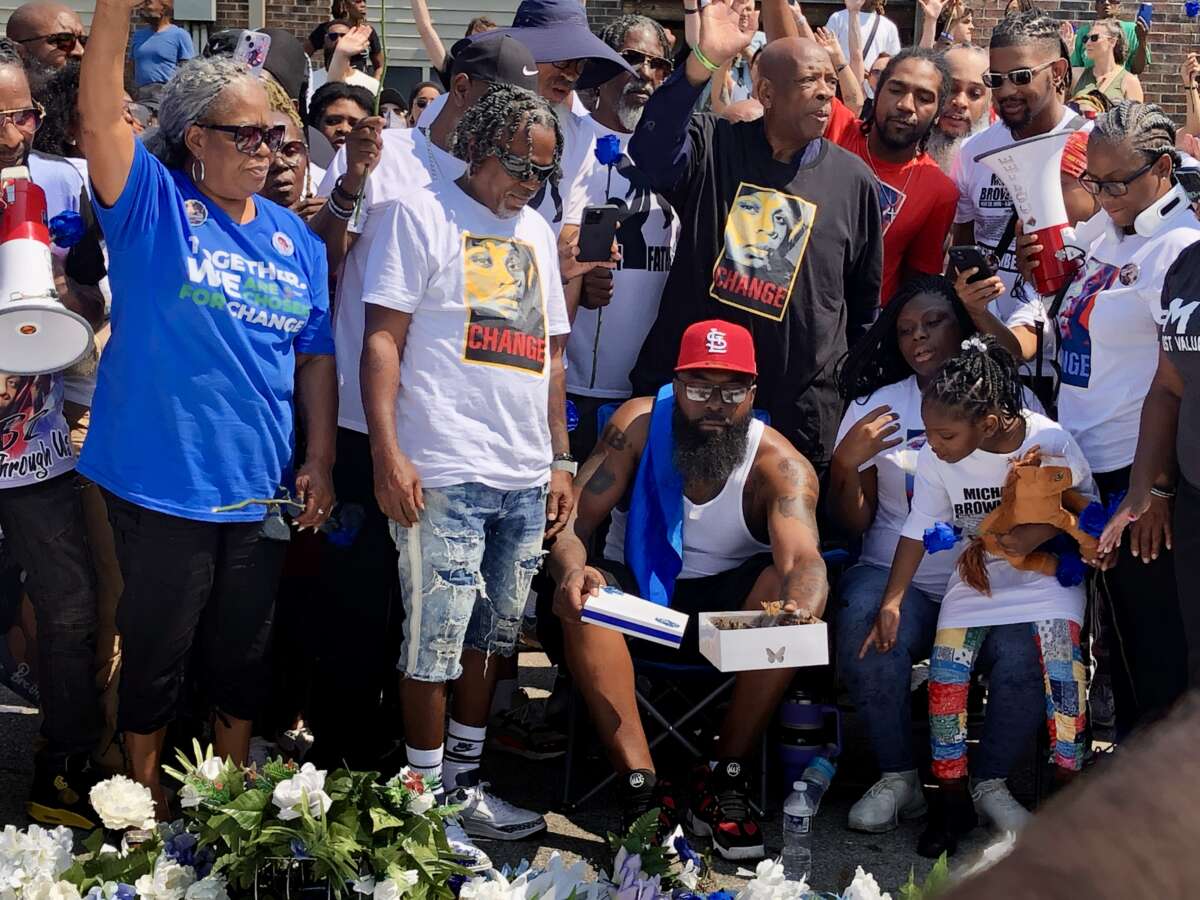Support justice-driven, accurate and transparent news — make a quick donation to Truthout today!
Michael Brown Sr. rejects any version of the Ferguson uprising that consigns the movement to the past. Ten years after his son, Michael Brown Jr. was killed by Darren Wilson, then a police officer in Ferguson, Missouri, Brown Sr. is still seeking accountability.
When Michael Brown Jr. was killed on August 9, 2014 — a Black teen shot six times by a white cop — protests erupted around the country, fueling a movement for racial justice that continues to this day. In Ferguson, regular protests took place in waves for more than a year. For years, there was a national spotlight on Ferguson, especially as the case against Darren Wilson moved through the criminal legal system. Wilson was ultimately never tried or charged. The Brown family settled a wrongful death lawsuit against the City of Ferguson, the former police chief and Wilson himself in June 2017.
Now, Brown Sr. is working through the Chosen for Change Organization he runs with his wife, Cal Brown, to build an ongoing legacy to honor his son. To that end, he told Truthout in an extensive interview on August 8, he’d had a hand in renaming the Canfield Green apartments, where his son took his last breath. Now, the apartment complex is called Renewal Heights, with the hope that the name might get people thinking about the possibilities for renewal.
Overall, Brown Sr. celebrates the infusions of enhanced business development since his son was killed, but he’s noticed that the new development papers over the reality of policing, which includes the police killing of his son.
“As they rebuild,” Brown Sr. said, “they’re trying to rebrand Ferguson and erase what happened. It’s why I have to do the work I do.”
There’s one potential clue he says won’t let him go until it’s resolved — a bullet he says is still lodged in the wall of an apartment next to where Wilson killed Mike Brown Jr.

“Why are people not talking about this bullet? It’s still in the wall,” he said.
He says it should be extracted and investigated as forensic proof that Brown Jr., who was unarmed, was moving away from Wilson when the police officer fired a barrage of bullets towards his son.
A Tough March on Purpose to Remember a Low Point in Racist Policing
Ten years into what he calls a “life sentence” of missing his eldest child, Mike Brown Sr. led the “All Roads Lead to Ferguson Unity Walk” from Normandy High School, where his son had graduated just eight days before his life was ended. Marchers from the neighborhood and the racial justice movement carried the red, black and green Pan-African flag, as well as a Black Lives Matter banner to the apartment complex where his son died.
Roses — royal blue, his son’s favorite color — lined the lane winding through the buildings, leading to a makeshift memorial. Plush toys, candles and flowers marked the spot where Brown was killed.
Members of the St. Louis Palestine Solidarity Committee marched as they had many times before in Ferguson 10 years earlier. They were shoulder to shoulder with the St. Louis chapter of Jewish Voice for Peace, which released a statement declaring solidarity “with the family of Mike Brown, the Ferguson organizers who changed St. Louis and the world, and Palestinians calling for their own liberation.”
Absent, however, were six participants in the Ferguson uprising whose deaths continue to haunt the struggle: Deandre Joshua, Darren Seals, MarShawn McCarrel, Edward Crawford Jr., Danye Jones and Bassem Masri. The circumstances of their deaths were mysterious — two were found, in separate incidents, in cars that had been set on fire — leaving other activists in the movement on edge.
Seals’s close colleague Nyota Uhura established Hands Up! Don’t Shoot!, a media platform for Ferguson frontliners to tell their own stories. She recently explained to Black Liberation Media podcaster Thandisizwe Chimurenga why she went underground after Seals’s homicide in September 2016, confessing to Chimurenga, “I still don’t feel safe.”
The Unity March route was an arduous four and a half miles, meant to recall the four and a half hours Mike Brown Jr.’s body was left on the ground.
“That’s what turned the whole city up right there,” Brown Sr. said. “You know that, right? It was the lack of respect of a human body laying in the middle of the street. That’s what took over everything.”
The memorial ceremony included four and a half minutes of silent meditation followed by the release of butterflies, marking the grace but also the fragility of the moment. The atmosphere was somber even as people valued the togetherness, which included both members of the St. Louis community as well as notable guests.

Cornel West, an academic and activist who is running for president in the 2024 election, looked out at the 300 people gathered to confront a painful collective memory and offered a welcome moment of uplift. “Michael Brown is part of a family of nobility and a people of royalty. And by nobility, I mean those who, like the eagle, fly high and look low,” he said.
Fred Hampton Jr., president and founder of the Black Panther Party Cubs, came from Chicago to salute the Brown family and the community for their “consistent resistance.” Hampton Jr., who lost his father to an FBI-backed assassination in December 1969 while still in his mother’s womb, said, “Ain’t no forgiving what they did to Mike Brown Jr.”
Congresswoman Cori Bush, still processing the implications of her loss in the Democratic primary on August 6 to St. Louis County Prosecutor Wesley Bell, offered some reflections. Bush, who is trained as a nurse, was on the streets organizing community medical services during the Ferguson uprising.
“So many of us have grown up in this movement. We have become different people, but further into our destiny, further into our purpose,” Bush said. “And as we do it, we remember where we started from, and we remember who we started with, and we remember why. We remember why, because there has still not been accountability. There has still not been justice for this family. There has still not been change — not enough for Black folks to feel it.”
Bush’s office issued a formal statement on the 10-year anniversary, saying “we will never stop working to build a world where Mike Brown would still be alive.”
Putting Bullet Injuries at the Center of Individual and Community Healing
As the speakers at the “State of Black St. Louis” panel at the Urban League the day before the march made abundantly clear, Black St. Louisans have lost a lot of ground this past decade, especially in health and longevity.
According to Kendra Holmes, a pharmacologist at the helm of Affinia Healthcare, a patient-centered health provider offering routine medical, behavioral health and dental care on a sliding scale, the long-term effects of slavery and a racist medical system have led to some truly alarming trends. For instance, maternal health rates rose from 40 Black women dying per 100,000 of population in 2014 to 55.3 Black women dying per 100,000 in 2024. Meanwhile, life expectancy for Black men in St. Louis has decreased from 71.8 years in 2014 to 68.3 in 2024. And, according to Holmes, overdose deaths for Black people were 7.5 per 100,000 population in 2014, but spiked to 36.8 in 2024.
As part of the 10th anniversary events, the Chosen for Change Organization arranged a tour of the Bullet Related Injury Clinic (BRIC), a newly opened community-based clinic in St. Louis that helps people heal after they’ve been shot. The clinic has already seen 850 individuals, averaging between 200 and 250 visits a month, and all services are offered free of charge.
The clinic’s medical director, LJ Punch, a former trauma surgeon, told Truthout there’s an extra layer of harm when a bullet injury is inflicted by police officers.
“Beyond all the ways in which a bullet-related injury causes harm, it creates broken trust. Broken trust makes it incredibly difficult to be present, to be around others, and to move through the world with purpose and clarity,” he said. “If you’re in a situation doing your best to survive, doing your best to live, and even the state itself can inflict this violence on your body through this act, the world doesn’t make sense anymore.”
Congresswoman Bush is credited with securing $3 million for the clinic. Wesley Bell, who will now be the Democratic nominee for Bush’s seat in November, did not come to the march, a decision which Brown Sr. predicted.
“He knows better than to come around. I wouldn’t have to say anything, but the community would,” he said.
Speakers did in fact refer to him as Wesley “Sell” — the current St. Louis prosecutor was aided in his race against Bush with millions in dollars from the American Israel Public Affairs Committee, a lobbying organization that is widely understood as a key force in securing U.S. backing for Israeli apartheid and the ongoing genocide in Gaza. Many Palestinians showed solidarity with Ferguson protesters during the 2014 uprising, pointing toward the shared experiences of occupation. Solidarity activists have criticized the collaboration between U.S. police departments and Israel.
Brown Sr. feels bitter about canvassing for Bell in 2018 during his campaign for the St. Louis prosecutor position.
“Everybody doing good, right, and this and that, and then they get in the seat, and you don’t hear nothing else from it. That stuff they sat down and talked to you about? It’s a whole different agenda,” he said. “Wesley Bell made a promise to my family sitting at a dinner table at [now closed diner] Goody Goody, that he would open and do a thorough investigation and prosecute this case. This is the reason why I put a team together, people in the community, to follow me in, because of this promise.”

He fears the prosecutor’s office could fall back into the hands of Bob McCulloch, or one of his family members. McCulloch handled the case against Darren Wilson, who was ultimately not indicted for killing Michael Brown Jr. Meanwhile, others fear Bell may not be able to hold the traditionally Black congressional seat Bill Clay Sr. won in 1968, and it could revert to white Democrats.
He’s uncertain in which year it happened, but Brown Sr. recalls an experience from a reception at a Conference of Mayors in Washington, D.C.: “They had a lot of the mayors chilling and just talking and mingling and [Cori Bush’s predecessor] Lacey Clay walked up. He was like, ‘We’re going to convict him,’” referring to Darren Wilson. “I said, ‘Is that a promise?’ ‘I promise you,’ he said, and that was it,” he said.
In the organization’s program held at the Missouri History Museum on August 8, “Our Children Before the Hashtag,” Brown Sr. shared a rush of fond memories about his son.
He recalled Mike Jr.’s special talent for repairing things.
“This boy,” Brown Sr. said about his son, “this boy can take things apart, put them back together, and they work.”
“He had a special laugh, he laughed like Dracula, you know — henh, henh, henh. He could blow smoke out his mouth without smoking anything.”
Brown Sr. reflected as far back as his son’s birth. “The first time I’ve seen Mike, he was shining. He had the biggest smile on his face, a big cone head. He was one of them big boys. I was very proud to be his father, for us to share the same name and journey.”
A terrifying moment. We appeal for your support.
In the last weeks, we have witnessed an authoritarian assault on communities in Minnesota and across the nation.
The need for truthful, grassroots reporting is urgent at this cataclysmic historical moment. Yet, Trump-aligned billionaires and other allies have taken over many legacy media outlets — the culmination of a decades-long campaign to place control of the narrative into the hands of the political right.
We refuse to let Trump’s blatant propaganda machine go unchecked. Untethered to corporate ownership or advertisers, Truthout remains fearless in our reporting and our determination to use journalism as a tool for justice.
But we need your help just to fund our basic expenses. Over 80 percent of Truthout’s funding comes from small individual donations from our community of readers, and over a third of our total budget is supported by recurring monthly donors.
Truthout has launched a fundraiser, and we have a goal to add 231 new monthly donors in the next 48 hours. Whether you can make a small monthly donation or a larger one-time gift, Truthout only works with your support.
